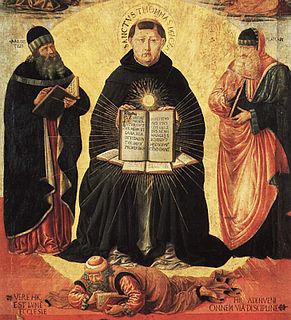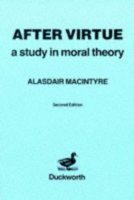Related Research Articles
Political freedom is a central concept in history and political thought and one of the most important features of democratic societies. Political freedom was described as freedom from oppression or coercion, the absence of disabling conditions for an individual and the fulfillment of enabling conditions, or the absence of life conditions of compulsion, e.g. economic compulsion, in a society. Although political freedom is often interpreted negatively as the freedom from unreasonable external constraints on action, it can also refer to the positive exercise of rights, capacities and possibilities for action and the exercise of social or group rights. The concept can also include freedom from internal constraints on political action or speech. The concept of political freedom is closely connected with the concepts of civil liberties and human rights, which in democratic societies are usually afforded legal protection from the state.

Teleology or finality is a reason or explanation for something as a function of its end, purpose, or goal, as opposed to as a function of its cause. A purpose that is imposed by a human use, such as the purpose of a fork to hold food, is called extrinsic.

Virtue ethics is a class of normative ethical theories which treat the concept of moral virtue as central to ethics. Virtue ethics is usually contrasted with two other major approaches in normative ethics, consequentialism and deontology, which make the goodness of outcomes of an action (consequentialism) and the concept of moral duty (deontology) central. While virtue ethics does not necessarily deny the importance of goodness of states of affairs or moral duties to ethics, it emphasizes moral virtue, and sometimes other concepts, like eudaimonia, to an extent that other theories do not.

Charles Margrave Taylor is a Canadian philosopher from Montreal, Quebec, and professor emeritus at McGill University best known for his contributions to political philosophy, the philosophy of social science, the history of philosophy, and intellectual history. His work has earned him the Kyoto Prize, the Templeton Prize, the Berggruen Prize for Philosophy, and the John W. Kluge Prize.

Aristotelianism is a philosophical tradition inspired by the work of Aristotle, usually characterized by deductive logic and an analytic inductive method in the study of nature and natural law. It answers why-questions by a scheme of four causes, including purpose or teleology, and emphasizes virtue ethics. Aristotle and his school wrote tractates on physics, biology, metaphysics, logic, ethics, aesthetics, poetry, theatre, music, rhetoric, psychology, linguistics, economics, politics, and government. Any school of thought that takes one of Aristotle's distinctive positions as its starting point can be considered "Aristotelian" in the widest sense. This means that different Aristotelian theories may not have much in common as far as their actual content is concerned besides their shared reference to Aristotle.

The is–ought problem, as articulated by the Scottish philosopher and historian David Hume, arises when one makes claims about what ought to be that are based solely on statements about what is. Hume found that there seems to be a significant difference between positive statements and prescriptive or normative statements, and that it is not obvious how one can coherently move from descriptive statements to prescriptive ones. Hume's law or Hume's guillotine is the thesis that, if a reasoner only has access to non-moral and non-evaluative factual premises, the reasoner cannot logically infer the truth of moral statements.

Analytical Thomism is a philosophical movement which promotes the interchange of ideas between the thought of Thomas Aquinas, and modern analytic philosophy.
Critique is a method of disciplined, systematic study of a written or oral discourse. Although critique is commonly understood as fault finding and negative judgment, it can also involve merit recognition, and in the philosophical tradition it also means a methodical practice of doubt. The contemporary sense of critique has been largely influenced by the Enlightenment critique of prejudice and authority, which championed the emancipation and autonomy from religious and political authorities.

Alasdair Chalmers MacIntyre is a Scottish-American philosopher who has contributed to moral and political philosophy as well as history of philosophy and theology.
Phronesis, translated into English by terms such as prudence, practical virtue and practical wisdom is an ancient Greek word for a type of wisdom or intelligence relevant to practical action. It implies both good judgment and excellence of character and habits, and was a common topic of discussion in ancient Greek philosophy, in ways which are still influential today.

Edward Caird was a Scottish philosopher. He was a holder of LLD, DCL, and DLitt.
The fact–value distinction is a fundamental epistemological distinction described between:
- 'Statements of fact', based upon reason and physical observation, and which are examined via the empirical method.
- 'Statements of value', which encompass ethics and aesthetics, and are studied via axiology.

After Virtue is a book on moral philosophy by the philosopher Alasdair MacIntyre. MacIntyre provides a bleak view of the state of modern moral discourse, regarding it as failing to be rational, and failing to admit to being irrational. He claims that older forms of moral discourse were in better shape, particularly singling out Aristotle's moral philosophy as an exemplar. After Virtue is among the most important texts in the recent revival of virtue ethics.
Nancey Murphy is an American philosopher and theologian who is Professor of Christian Philosophy at Fuller Theological Seminary, Pasadena, CA. She received the B.A. from Creighton University in 1973, the Ph.D. from University of California, Berkeley in 1980, and the Th.D. from the Graduate Theological Union (theology) in 1987.

John Niemeyer Findlay, usually cited as J. N. Findlay, was a South African philosopher.
"Modern Moral Philosophy" is an article on moral philosophy by G. E. M. Anscombe, originally published in the journal Philosophy, vol. 33, no. 124.
Ethics is the branch of philosophy that examines right and wrong moral behavior, moral concepts and moral language. Ethics or moral philosophy is a branch of philosophy that "involves systematizing, defending, and recommending concepts of right and wrong behavior". The field of ethics, along with aesthetics, concerns matters of value, and thus comprises the branch of philosophy called axiology.
The philosophy of human rights attempts to examine the underlying basis of the concept of human rights and critically looks at its content and justification. Several theoretical approaches have been advanced to explain how and why the concept of human rights developed.
A Critique of Pure Tolerance is a 1965 book by the philosopher Robert Paul Wolff, the sociologist Barrington Moore Jr., and the philosopher Herbert Marcuse, in which the authors discuss the political role of tolerance.
References
- ↑ Skelton, Anthony. "William David Ross". In Zalta, Edward N. (ed.). Stanford Encyclopedia of Philosophy .